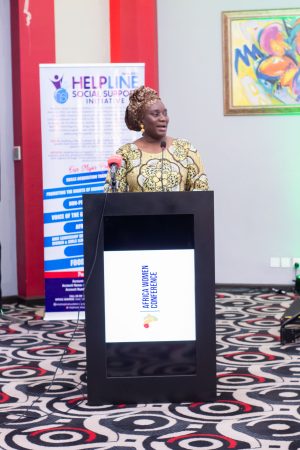African women who gathered in Lusaka, Zambia, for the Africa Women Conference (AWC), have called for improved digital infrastructure, education, and empowerment to foster women’s inclusion in Africa’s digital economy.
Speaking at the 8th Africa Women Conference, AWC Co-convener Dr Jummai Ahmadu stated that the conference provides “a vital platform for collaboration, learning, and sharing innovative ideas,” exploring digital advancement across areas such as entrepreneurship, education, health, and social advocacy, which aims to break barriers and promote a future where African women lead in decision-making and innovation.”

“Technology is a powerful tool that can amplify our voices, enhance our skills, and pave pathways to success. Let us champion inclusivity and ensure no woman is left behind in this digital revolution. Together, let us embrace this opportunity and work towards a future of digital equality for women across Africa,” she said.
In her address, Minister of Women Affairs, Hajiya Imaan Suleiman-Ibrahim encouraged delegates to propose recommendations to enhance African women’s participation in the African Continental Free Trade Agreement (AfCFTA).
“By leveraging AfCFTA, African women can unlock new economic opportunities, enhance their participation in trade, and contribute to the continent’s growth and development,” she said.
Opening the conference, Mrs. Mainga Kabika, Permanent Secretary of the Gender Division in the Zambian Presidency, emphasised the importance of expanding women’s access to digital resources, noting that it is “crucial for meaningful economic participation and the resilience of our communities.” She added, “Let us create an Africa where every woman, regardless of her location or socio-economic background, can seize the opportunities the digital era offers.”
Kabika also highlighted the systemic barriers women face, saying, “Women often face systemic barriers. Let us work together to scale these efforts, sharing resources, strategies, and innovative approaches to collectively narrow the digital divide.”
Also Read: ITU Global Innovation Forum Unveils Strategies to Close Digital Gap
In his keynote address, Mr William Carew, Principal Coordinator and Head of Secretariat at the African Union Economic Social and Cultural Council (AU ECOSOCC), described technology as “A powerful catalyst for change” that drives inclusion, innovation, and opportunity, though he cautioned that the digital divide remains a significant obstacle in parts of Africa. “…women are trailblazers in entrepreneurship and innovation. It is crucial to ensure that women and girls, who represent more than half of our population, are not left behind in this digital revolution,” he said.
Carew urged civil society organisations to advocate for policies promoting digital inclusivity and to challenge gender biases limiting women’s access to technology.
“Through policy engagement with governments and other key stakeholders, civil society can help ensure that digital policies on the continent integrate the unique needs and challenges of women and girls,” he added.
President of the Wives of FCT Traditional Rulers, Hajiya Hauwa Ibrahim, noted that empowering women in technology is not only about equality but about “unlocking the full potential of our society through the innovation, creativity, and progress that women bring.” She explained that “when women are given the tools, resources, and opportunities to succeed, they not only excel in their respective fields but also inspire and empower future generations of women.”
Despite existing challenges, Ibrahim highlighted that empowering women in technology fosters a more equitable and innovative society, where women have “a seat at the table where decisions are made, solutions are crafted, and futures are shaped.”
The theme of the 8th Africa Women Conference in Lusaka, Zambia, is Digital Advancement: Harnessing Its Potential for the African Woman.


Comments are closed.